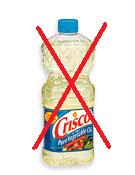|
|
Fats; some good, some bad.
Dietary fats have been the subject of study, research, discussion and both good and bad information for the last 50 years. There is general agreement that some are essential and good for our health and some are bad. One of the problems with medical science is that it tends to label things good or bad. If they decide it's bad that means you should not eat it at all and this is simply not good advice. There are four general categories. Let's take a look at them.
Modern medicine labels these three as good. - Monounsaturated...Remains liquid at room temperature but may start to solidify in the refrigerator. Sources include olive, peanut and canola oils. Avocados and most nuts also have high amounts of monounsaturated fat.
- Polyunsaturated...Usually liquid at room temperature and in the refrigerator. Sources are vegetable oils, such as safflower, corn, sunflower, soy and cottonseed oils.
- Omega-3 fatty acids...Polyunsaturateds found mostly in
seafood
. Good sources are cold-water fish, such as salmon, mackerel and herring. Flaxseeds, flax oil and walnuts also contain omega-3 fatty acids, and small amounts are found in soybean and canola oils.
Modern medicine labels these three as bad
- Saturated fat... Usually solid or waxy at room temperature, most often found in animal products such as red meat, poultry, butter and whole milk. Other foods include coconut, palm and other tropical oils.

- Trans fat... Also referred to as trans-fatty acids, It comes from adding hydrogen to vegetable oil through a process called hydrogenation. This makes it more solid and less likely to spoil. It is a common ingredient in commercial baked goods — such as crackers, cookies and cakes — and in fried foods, such as doughnuts and french fries. Shortenings and some margarines also are high sources.
- Dietary cholesterol...Your body naturally manufactures all of the cholesterol it needs, but you also get cholesterol from animal products, such as meat, poultry, seafood, eggs, dairy products, lard and butter.
My greatest disagreement with medical 'experts' is in their total condemnation of saturated fats. There is growing evidence that in many ways they are better for you than polyunsaturated fats. Butter, in moderation, can be good for you.
Coconut oil
has been found to have numerous health benefits. Anything taken in excess is, of course, bad for your health.
I totally agree that trans fats are the absolute worst. If you avoid deep fried foods and commercially baked things you probably won't have to worry about fat in your diet.
Return fom Fats to Diet
Return from Fats to Vitality-After-60 Homepage
|
|






